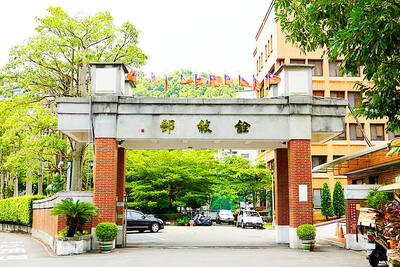The nation’s global competitiveness has climbed two notches to 13th place this year, thanks to a top ranking in economic stability as authorities effectively kept inflation and government debt at bay, according to a World Economic Forum (WEF) report released yesterday.
The improvement came after the Geneva, Switzerland-based organization adopted a new methodology to better capture an emerging set of drivers on productivity and growth in the era of the “fourth industrial revolution.”
Taiwan was the fourth-best performer in the Asia-Pacific region after Singapore (second), Japan (fifth) and Hong Kong (seventh), but ahead of Australia (14th), South Korea (15th), New Zealand (18th) and China (28th).
The WEF measured 140 economies using 98 indicators grouped under 12 major groups.
The US earned top spot on its market size, stability and innovation ecosystem — including idea generation, entrepreneurial culture, openness and agility.
Taiwan won the top spot in macroeconomic stability with a 10-year GDP average of 2.6 percent, supported by benign inflation and low government debt.
East Asia and Pacific economies including Taiwan were the fastest-growing in the world and drove about one-third of global growth last year, primarily due to China’s contribution, the WEF report said.
The region’s developing economies grew 6.6 percent, owing to a favorable global economic outlook that encouraged a rise in exports, it said.
Most boast world-class physical and digital infrastructure and connectivity, macroeconomic stability, strong human capital and well-developed financial systems, although performance on the innovation ecosystem is uneven, it said.
Taiwan was fourth in innovation capability with room for improvement in multi-stakeholder collaboration and scientific publications, it said. Meanwhile, its research and development expenditure has stagnated against GDP.
“The region’s innovation hubs — Japan, [South] Korea, and Taiwan — could improve on the so-called ‘softer’ drivers of innovation to attain the level of ‘super innovators’ such as Germany, the US and Switzerland,” it said.
The nation’s infrastructure score declined from last year, as the indices on the reliability of water supply, quality of roads and airport connectivity fell, it said.
Taiwan achieved seventh place in financial system performance, thanks to the world’s lowest non-performing loans and the highest insurance premiums against GDP, the report found.
The WEF’s findings lent support to the government’s New Southbound Policy as South Asia remains the region with the lowest trade penetration in the world, with imports and exports of both services and merchandise amounting to 39 percent of regional GDP last year.
The report also called for openness in global trade, saying liberalization is good for competitiveness and not necessarily bad for inclusion.
“International trade helps drive down wages and employment in the manufacturing sectors most exposed to foreign competition, but protectionist policies to curb income inequalities would be ineffective and counterproductive,” it said.

Taiwan Semiconductor Manufacturing Co (TSMC, 台積電) is expected to start construction of its 1.4-nanometer chip manufacturing facilities at the Central Taiwan Science Park (CTSP, 中部科學園區) as early as October, the Chinese-language Liberty Times (the Taipei Times’ sister newspaper) reported yesterday, citing the park administration. TSMC acquired land for the second phase of the park’s expansion in Taichung in June. Large cement, construction and facility engineering companies in central Taiwan have reportedly been receiving bids for TSMC-related projects, the report said. Supply-chain firms estimated that the business opportunities for engineering, equipment and materials supply, and back-end packaging and testing could reach as high as

CHAMPIONS: President Lai congratulated the players’ outstanding performance, cheering them for marking a new milestone in the nation’s baseball history Taiwan on Sunday won their first Little League Baseball World Series (LLBWS) title in 29 years, as Taipei’s Dong Yuan Elementary School defeated a team from Las Vegas 7-0 in the championship game in South Williamsport, Pennsylvania. It was Taiwan’s first championship in the annual tournament since 1996, ending a nearly three-decade drought. “It has been a very long time ... and we finally made it,” Taiwan manager Lai Min-nan (賴敏男) said after the game. Lai said he last managed a Dong Yuan team in at the South Williamsport in 2015, when they were eliminated after four games. “There is

Democratic nations should refrain from attending China’s upcoming large-scale military parade, which Beijing could use to sow discord among democracies, Mainland Affairs Council Deputy Minister Shen You-chung (沈有忠) said. China is scheduled to stage the parade on Wednesday next week to mark the 80th anniversary of Japan’s surrender in World War II. The event is expected to mobilize tens of thousands of participants and prominently showcase China’s military hardware. Speaking at a symposium in Taichung on Thursday, Shen said that Chinese Minister of Foreign Affairs Wang Yi (王毅) recently met with Indian Prime Minister Narendra Modi during a visit to New Delhi.

FINANCES: The KMT plan to halt pension cuts could bankrupt the pension fund years earlier, undermining intergenerational fairness, a Ministry of Civil Service report said The Chinese Nationalist Party (KMT) caucus’ proposal to amend the law to halt pension cuts for civil servants, teachers and military personnel could accelerate the depletion of the Public Service Pension Fund by four to five years, a Ministry of Civil Service report said. Legislative Speaker Han Kuo-yu (韓國瑜) on Aug. 14 said that the Act Governing Civil Servants’ Retirement, Discharge and Pensions (公務人員退休資遣撫卹法) should be amended, adding that changes could begin as soon as after Saturday’s recall and referendum. In a written report to the Legislative Yuan, the ministry said that the fund already faces a severe imbalance between revenue